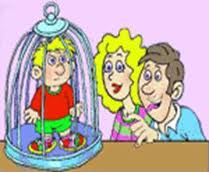TERRIBLE TWO
Two years period is magical period in the life of child and parents.Child begins to act free and s/he is able to express himself/herself which s/he begins to show obstinacy in this period.
Child’s brain development occurs very fast in two years. S/he realizes that s/he has different personality from other people. And also s/he realizes her /his value in the family. In this period child wonders everything and asks too many questions. In this period child can understand everything and obey the orders and records evertything that exists around himself/herself.
In this period it is very important to answer all the questions of the child for his/her healthy devlopment. First indications about the personality of the child are given in this age. Two age is important because obstinacy occurs in this period which stresses the families and for this reason this period is called as ‘obstinacy period’ or ‘terrible two’. Two years of child begins to say ‘no‘ to everything and when s/he sees the effect of using ‘no’ s/he wants to use it in everywhere and everytime. From now on your child is saying that s/he had different character and different desires. Parents should know that this period is temporary era and will end in 2-3 years.
If you behave stubbornly towards your child, this will make everything worse. The dicipline rules in the family should be obeyed but they should not be present a challenge for child because stubborning child became angry and has tantrum. In this period the behaviour of parents is very important. It is recomended for parents to wait upto end of his/her tantrum and not to fall upon himself/herself. The main intention should be to solve the problem before the tantum. The common fault that parents perform is to do what child desires after his/her tantrum. In this periods, child will realize that his desires are performed when s/he cries and stubborns so s/he will try to make his/her parents to do her/his desires with his/her cries.This will form his/her behaviours.
The first step should be to talk with him/her and assure him/her. It is important to abstract him/her.The first aim of stubborning child is to abstract on himself/herself. If you talk with your asserting child this means that you appreciate him/her, but sometimes it is impossible to calm your child. Never shout at your child or got angry with him/her because s/he will shut up because s/he is afraid or s/he will cry more. Do not talk with your child during his/her tantrum. In these periods stop talking and leave your child in safety place alone while waiting the end of his/her tantrum. Tell him/her that you were understanding him/her and you would talk with him/her when s/he became calm. In this way your child will see that his/her actions did not influence you. It is important to be calm and mean. You should talk and find a solution with your child after s/he became calm.
While talking use ‘I’ language instead of ‘you‘ like ‘I sadden when you cry’ instead of ‘you are sadden me’. Use the same desicive behaviour in every crises. Do not forget that the behaviours of parents designate the behaviours of child in the future. Finally, we can conclude as to talk and appreciate your child before crises is very important. If you talk with your child and explain him/her the problem s/he will feel himself/herself valuable and will show gentle behaviours.




